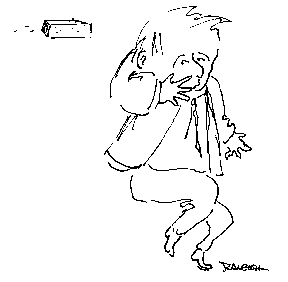 |
The Great Critical Debate
By
HENRY P. RALEIGH
ART TIMES January February
2008
SOME
MONTHS AGO there appeared an article in Variety on the current
state of contemporary film criticism. Here was yet another attack; there
have been many of these recently, on a profession that is not much more
than one hundred years old. Now it seems a British film historian, Ronald
Bergan, had come right out and said that todayís film criticism sucks
— well, he didnít say ësuckí actually. You know a Brit wouldnít
put it that way but it amounted to the same thing and he got some other
critics pretty worked up about it. Iím generally unmoved by such professional
squabbles, being perfectly content with my inner critical self yet I
do feel compelled to introduce some calming reason into this unfortunate
conflict.
The
essence of Mr. Berganís protest lies in his claim that film critics,
at least those who profess to be on their IRS returns at any rate, just
arenít too bright. They lack a solid formal education. I presume he
means something more than a minimal working knowledge of the fundamentals
of reading and writing. He suggests a degree in film studies would be
a good start.
Right
off the bat we find a weakness in Mr. Berganís rant. I myself have taught
film studies — nicely too — and I donít have a single
degree in this subject area. This might seem to be a case of the
blind leading the blind, but I do have degrees in other interesting
things that surely make up for this lack. I have found that an ability
to use the terms ìmontageí, ëmise-en-scËneí and ëgenreí in more-or-less
their proper sense is sufficient substitute for any number of degrees.
Mr. Bergan, I imagine, has a degree or two in film history, however
having taught film history as well, I certainly know what thatís all
about — a leisurely matter of showing a lot of films, and if any
time remains in the standard two and a half hours of a college course,
holding a bit of chit-chat.
Mr.
Berganís second point is that simply too much of what passes as film
criticism is subjective. To that I say, what isnít? One of Americaís
most respected critics, Pauline Kael, was an enthusiastic advocate of
the subjective approach. See a film just once, she advised, a fast glance
and never go back to give it a second chance. Why, the publication Entertainment
Weekly carries a section now and then, which pronounces critical
judgments of films from no more than their trailers. And with remarkable
accuracy, too. Often a title and a brief, non-committal summary of plot
will do. I can come to judgment at the mere mention of Adam Sandler,
nothing more of the film is necessary. Ms. Kael, in an article, ìTrash,
Art and the Moviesî, noted that critics are frequently asked why they
are not more concerned with techniques and visual qualities of films.
Her well argued response to these queries may be succinctly summed up
thus: To hell with that stuff.
Look,
the first serious work in film criticism was Vachel Lindssyís The
Art of the Moving Picture in 1915. Mr. Lindsay was a poet, for goodness
sake; I mean how subjective can you get? He had no degrees in film studies
or history, nothing to stand in the way of his taking childish delight
in seeing Douglas Fairbanks in the super-action, campy extravaganza
ìThe Thief of Baghdadî in 1924. Compare that to Sergei Eisensteinís
1925 ìThe Battleship Potemkinî, a classic of film history, staple of
every film studies program, exhaustively analyzed from top to bottom
and, aside from an enjoyable slaughter in the Odessa Steps scene, is
as clunky and soporific as they come.
Readers
may recall that I have annually cited the batting averages, so to speak,
of the countryís major film critics. Eighty percent of them can spot
a real dog when they see one in an array of a yearís film showings —
there are always a few hold-outs so subjective as to be out of their
minds. Ninety percent will agree on the top three films, sixty percent
on the very best of the lot. Everything in between is anybodyís game.
So you see, of fifteen film critics some we can figure are passionately
subjective in judgment and some may be cold-bloodedly analytical —
still it all ends up about the same year after year.
Film
bloggers arenít really counted in all this; they multiply like rabbits,
too fast to count and one can guess there are a goodly number of unemployed
film studies graduates among this teeming horde. Bloggers have become
the bane of professional print critics what with all their show-offy
opinions. Yet it must be said film blogging is subjective criticism
at its very best. In a rush to display their inflated egos all over
the internet, they have no time to coolly research an analyze anything.
While Iím at it, let it be said that I never, ever, enter cyberspace
— it does have a tendency to make me nauseous.
